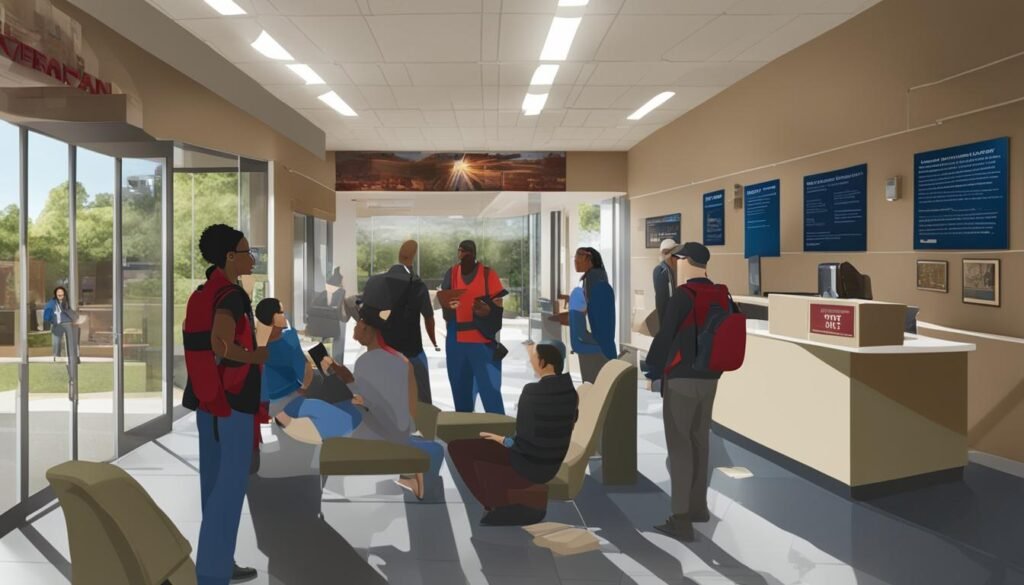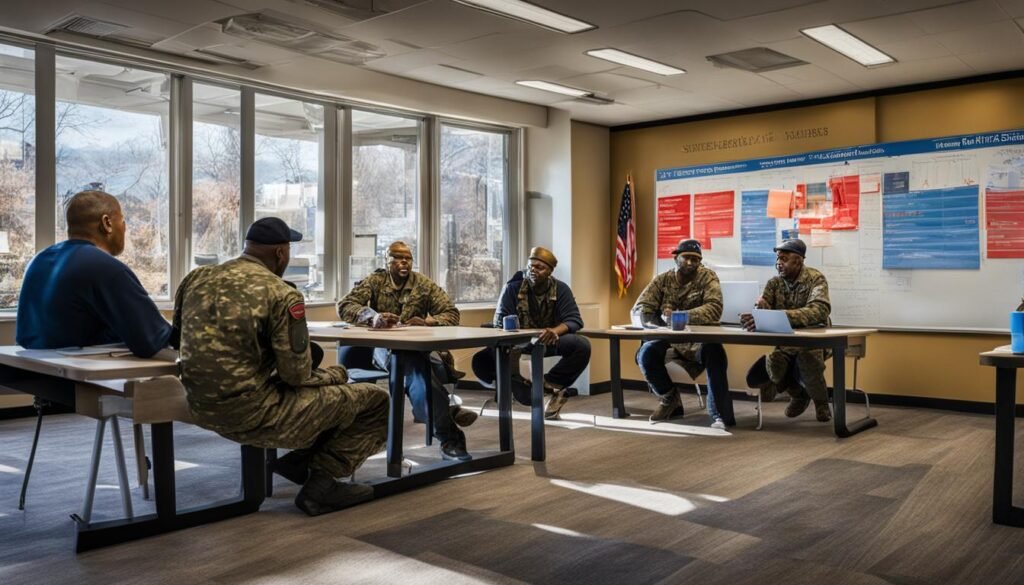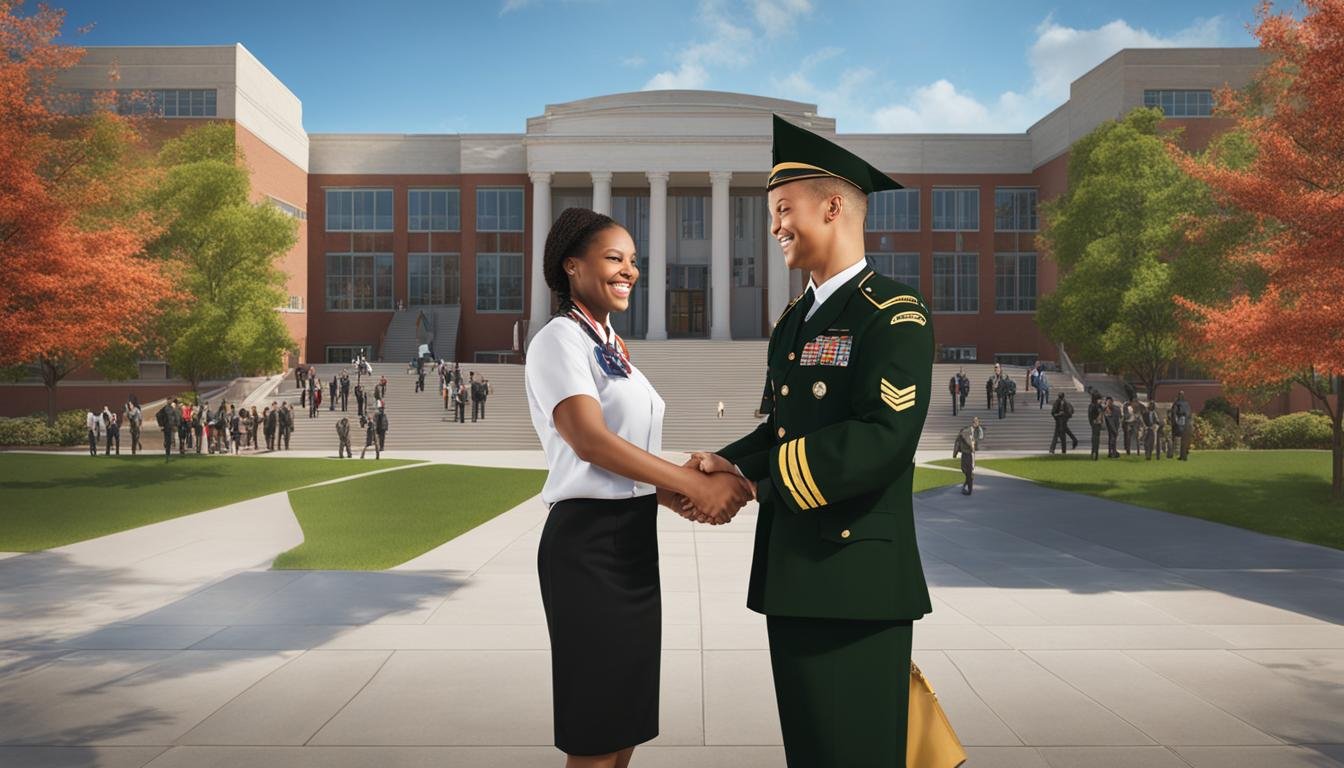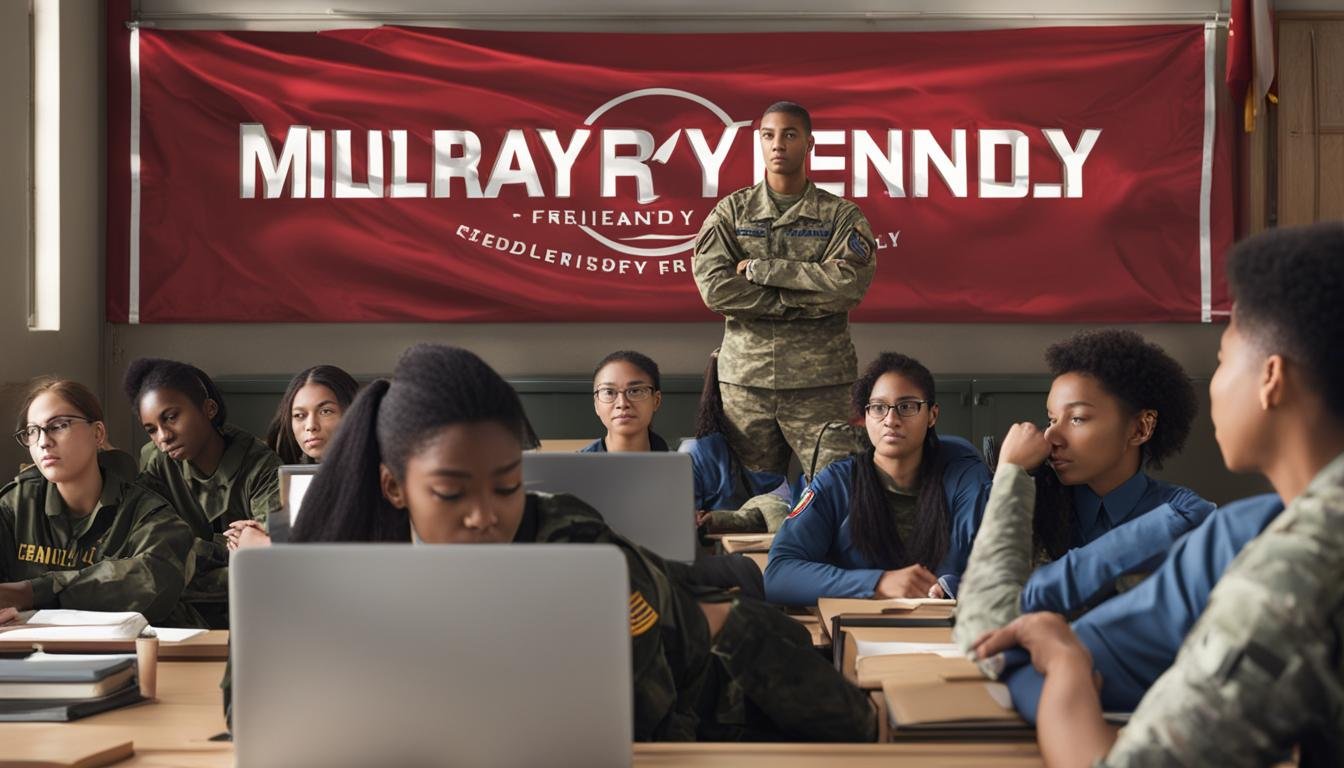When selecting a college, it’s important to consider the support services available for veterans. Evaluating veteran support services in colleges can help ensure that you make an informed decision that aligns with your needs and goals. Understanding the importance of veteran support in college selection is key to creating a successful academic journey.
A study conducted in 2022 revealed that while services for veterans in college are accessed and utilized, few contribute to long-term success. However, there are specific services that have been found to be instrumental in supporting veteran students. These include the Veterans Resource Center, VA benefits certification, library resources, career services, and counseling programs. It’s crucial to evaluate colleges based on these services to ensure that you receive the support you need to thrive in your educational journey.
Key Takeaways:
- Evaluating veteran support services in colleges is crucial for making an informed decision.
- Services such as the Veterans Resource Center, VA benefits certification, library resources, career services, and counseling programs contribute to long-term success.
- Understanding the importance of veteran support in college selection ensures a successful academic journey.
- Evaluate colleges based on the availability and effectiveness of these support services.
- Choose a college that prioritizes the well-being and success of veteran students.
The Value of Veteran Support Programs
Research has shown that veteran support programs in colleges are invaluable for the academic success of veteran students. These programs provide essential resources and guidance that contribute to higher GPAs and overall achievement. One such program is academic advising, where veterans are paired with advisors who understand their unique needs and challenges.
Veteran academic advising programs in colleges offer personalized guidance on course selection, degree planning, and balancing academic responsibilities with other commitments. Advisors help veterans navigate the college system and make informed decisions that align with their career goals. This comprehensive support ensures that veteran students have the necessary tools and strategies to excel academically.
Another effective support program is veteran peer mentoring. These programs pair experienced veteran students with newcomers, creating a support network that fosters a sense of belonging and camaraderie. Veteran peer mentors offer guidance on various aspects of college life, from academic challenges to social integration. The mentorship relationship allows veterans to learn from their peers’ experiences and leverage the unique skills and perspectives they bring to the campus community.
“Having a veteran peer mentor made all the difference in my college experience. They understood the challenges I faced and provided invaluable advice and support. I always felt like I had someone in my corner.”
Veteran support programs like academic advising and peer mentoring not only contribute to the success of veteran students but also enrich the campus environment. The diverse perspectives and skills that veterans bring to college campuses enhance the learning experience for everyone. These programs foster a supportive community where veterans can thrive academically and personally.
Veteran Academic Advising Programs in Colleges
The veteran academic advising programs in colleges are designed to provide personalized guidance and support to veteran students. They help veterans navigate the college system, select appropriate courses, and stay on track towards degree completion. Advisors who specialize in working with veterans understand the unique challenges they may face and offer strategies to overcome them. Through regular meetings and ongoing support, these programs ensure that veteran students receive the necessary assistance to succeed academically.
Veteran Peer Mentoring Programs in College
Veteran peer mentoring programs in college connect experienced veteran students with newcomers, creating a support network that fosters a sense of community and belonging. Peer mentors provide guidance on various aspects of college life, including academic challenges, campus resources, and social integration. The mentorship relationship offers a safe and supportive environment for veterans to share their experiences and learn from one another, ultimately contributing to their success in college.
| Veteran Support Programs | Benefits |
|---|---|
| Academic Advising |
|
| Peer Mentoring |
|
Evaluating Mental Health Support for Veterans in Colleges
When it comes to supporting the mental health of veteran students in colleges, evaluating the available resources and services is crucial. These services play a vital role in ensuring the well-being and academic success of veterans in higher education. By assessing the effectiveness and accessibility of mental health support, colleges can better address the unique challenges faced by veteran students.
One aspect to consider is the availability of counseling services specifically tailored to veterans’ needs. These services should provide a safe and supportive environment for veterans to seek help for various mental health concerns, such as post-traumatic stress disorder (PTSD), anxiety, and depression. Additionally, evaluating the accessibility of these services is essential to ensure that veterans can easily access and utilize them when needed.
Another important consideration is the provision of disability support services for disabled veteran students. These services should cater to the specific needs of veterans with disabilities, ensuring that they have equal access to education and necessary accommodations. By evaluating the availability and effectiveness of disability support services, colleges can ensure that disabled veteran students receive the support they need to succeed academically.
| Evaluating Mental Health Support for Veterans in Colleges |
|---|
| • Assess the availability of counseling services tailored to veterans’ needs |
| • Evaluate the accessibility of mental health support services |
| • Review the provision of disability support services for disabled veteran students |
Overall, by critically evaluating the mental health support available for veterans in colleges, educational institutions can ensure that these services meet the unique needs of veteran students. By addressing mental health concerns and providing accessible resources, colleges can create a supportive environment that enhances the well-being and success of veteran students.
Evaluating Career Services for Veterans in Colleges
Transitioning from a military career to civilian life can be a challenging experience for veterans pursuing higher education. To ensure their successful integration into the job market, colleges offer career services specifically designed for veteran students. These services aim to provide guidance, resources, and support throughout their journey. Evaluating the effectiveness of these career services is crucial to ensure that veterans receive the necessary assistance to thrive in their chosen career paths.
One way to evaluate career services for veterans is through the analysis of job placement rates. By tracking the percentage of veteran students who secure employment within a certain time frame after graduation, colleges can assess the impact of their career services programs. This data provides valuable insights into the effectiveness of the services offered and helps identify areas for improvement.
Another aspect to consider when evaluating career services is the availability of networking opportunities. Connecting veteran students with industry professionals can open doors to internships, mentorship programs, and job prospects. Colleges that prioritize building robust networks for their veteran students demonstrate a commitment to their success beyond the classroom.
Additionally, assessing the satisfaction of veteran students with the career services provided is essential. Surveys and feedback mechanisms allow colleges to gather valuable input from veterans directly. By understanding their needs, preferences, and challenges, colleges can continuously improve their career services and tailor them to meet the unique requirements of veteran students.
Ultimately, evaluating career services for veterans in colleges enables institutions to create effective programs that empower and support veterans in their transition to civilian employment. By prioritizing job placement rates, networking opportunities, and student satisfaction, colleges can provide the necessary resources to ensure veterans’ success in their professional endeavors.
| Key Factors to Evaluate Career Services for Veterans |
|---|
| Job Placement Rates |
| Networking Opportunities |
| Student Satisfaction |
Campus Resources for Veterans in Higher Education

When it comes to supporting the success of veteran students in higher education, colleges must provide a range of campus resources. These resources play a crucial role in facilitating the integration of veterans into the college environment and ensuring their academic and personal well-being. From social integration programs to essential services, veterans should have access to various resources that address their unique needs and challenges.
Social Integration Programs
Social integration programs are instrumental in creating a sense of belonging and community among veteran students in colleges. These programs provide opportunities for veterans to connect with peers who share similar experiences, fostering a supportive network that can help them navigate the challenges of college life. Veteran clubs, support groups, and mentorship programs are a few examples of social integration programs that can enhance the overall college experience for veterans.
Academic and Technology Resources
In addition to social integration programs, veterans should also have access to academic resources that support their learning and success in higher education. Academic support centers can provide tutoring, study groups, and academic advising tailored to the unique needs of veteran students. Access to libraries with extensive research materials and technology services that assist with online learning and computer literacy are also essential for veterans to thrive academically.
| Types of Campus Resources for Veterans | Description |
|---|---|
| Academic Support Centers | Offer tutoring, study groups, and academic advising |
| Libraries | Provide access to research materials and resources |
| Technology Services | Assist with online learning and computer literacy |
| Social Integration Programs | Create a sense of belonging and community |
| Veteran Clubs and Support Groups | Connect veterans with peers and mentors |
By offering a comprehensive range of campus resources for veterans, colleges can ensure that these students have the necessary support to excel in their higher education journey. From fostering social connections to providing academic and technology resources, colleges must prioritize the well-being and success of veteran students through the provision of relevant and accessible resources.
The Effectiveness of Veteran Support Programs

When evaluating the effectiveness of veteran support programs, it is crucial to gather feedback from veterans themselves. Their insights and experiences provide valuable information that can help shape and improve these programs. By actively seeking input from veterans, colleges can ensure that their support services are tailored to meet the unique needs and challenges faced by veteran students.
Quantitative data on program outcomes is also essential in evaluating the effectiveness of veteran support programs. Gathering data on graduation rates, job placement, and satisfaction surveys allows colleges to measure the impact of their support services on the long-term success of veteran students. This data provides a comprehensive view of the program’s effectiveness and can guide decision-making and resource allocation to continuously improve and adapt these programs.
Evaluating Program Outcomes
One way to assess the effectiveness of veteran support programs is by analyzing graduation rates. Comparing the graduation rates of veteran students who have participated in these programs to those who have not can provide valuable insights into their impact. Additionally, job placement rates can demonstrate how well these programs prepare veterans for successful transitions into the workforce.
“The support programs offered by colleges play a crucial role in supporting the success of veteran students.”
Satisfaction surveys are another valuable tool in evaluating program effectiveness. These surveys allow veteran students to provide feedback on the quality and usefulness of the support services they have received. By listening to the voices of veteran students, colleges can gain a deeper understanding of the strengths and areas for improvement in their support programs.
| Program Outcome | Measurement | Importance |
|---|---|---|
| Graduation Rates | Compare rates between veterans in support programs and those without | Demonstrates the impact of support programs on academic success |
| Job Placement | Track rates of employment for veterans in support programs | Indicates the effectiveness of programs in preparing veterans for the workforce |
| Satisfaction Surveys | Collect feedback from veteran students on the support services received | Provides insights into the quality and effectiveness of support programs |
Evaluating the effectiveness of veteran support programs is an ongoing process. By continuously gathering feedback, analyzing program outcomes, and making data-driven decisions, colleges can ensure that their support services meet the needs of veteran students and contribute to their overall success.
Conclusion
In conclusion, evaluating the effectiveness of veteran support programs in colleges is crucial for addressing the needs and challenges faced by veteran students. By assessing and improving various aspects of support, colleges can create an inclusive and supportive environment for veterans pursuing higher education.
Mental health support services play a vital role in the well-being and academic success of veteran students. Accessibility to counseling and disability support services is essential for ensuring equal access to education and providing the necessary resources for their overall success.
Career services also play a crucial role in supporting veterans’ transition from military to civilian life. Evaluating the effectiveness of career services helps ensure that veterans receive the guidance and resources needed to enter the job market successfully. Resume building, job search assistance, and networking opportunities are some of the services that can aid in their career development.
Additionally, colleges should provide a range of campus resources to facilitate the integration of veterans into the higher education environment. By offering social integration programs such as veteran clubs and support groups, colleges can create a sense of belonging and community among veteran students. Access to academic support centers, libraries, and technology services is also crucial for their academic success.
FAQ
Are there specific services in colleges that contribute to the long-term success of veterans?
Yes, services such as the Veterans Resource Center, VA benefits certification, library, career, and counseling have been found to contribute to the long-term success of veterans in college.
Is there a statistical relationship between demographic factors (e.g., gender, race) and success among veterans in college?
No, the study found that there is no statistical relationship between demographic factors and success among veterans in college.
How do student veterans perform academically compared to their nonveteran counterparts?
Research has shown that student veterans have higher GPAs than their nonveteran counterparts.
What unique characteristics do student veterans demonstrate?
Student veterans demonstrate unique characteristics such as adaptability, resilience, and leadership skills.
How do veteran support programs contribute to the academic success of veterans in colleges?
Veteran support programs, such as academic advising and peer mentoring, contribute to the academic success of veterans in colleges.
Why is evaluating mental health support services for veterans in colleges important?
Providing accessible mental health resources and services can significantly impact the well-being and academic success of veteran students.
What specific resources and services do veterans with disabilities require in colleges?
Veterans with disabilities require specific accommodations and accessibility services to ensure equal access to education.
How do career services support veteran students’ transition from military to civilian life?
Career services provide guidance and resources to help veteran students successfully enter the job market, including resume building, job search assistance, and networking opportunities.
What campus resources are important for the integration of veterans into higher education?
Campus resources such as academic support centers, libraries, and technology services are crucial for the success of veteran students in higher education.
Social integration programs such as veteran clubs and support groups help create a sense of belonging and community among veteran students.
How can the effectiveness of veteran support programs be evaluated?
The effectiveness of veteran support programs can be evaluated through feedback from veterans themselves, as well as data on program outcomes such as graduation rates, job placement, and satisfaction surveys.



